Fifa corruption scandal: Why should I care?
- Published
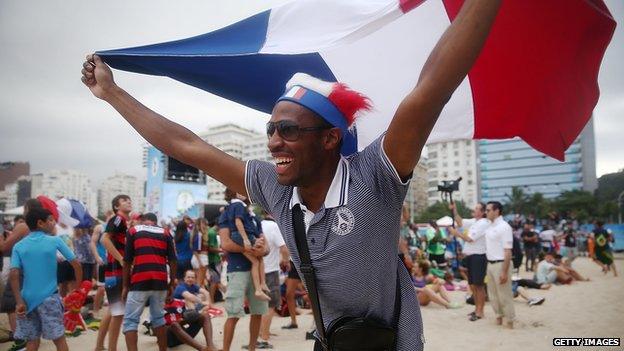
Fans love the World Cup - but some of us aren't as bothered
The Fifa scandal has dominated headlines around the world for the past week. But why should allegations of corruption within a sports organisation really matter that much to those of us who just aren't interested in football?
June and July usually offer a respite from football-related news for people who are, well, non-fans. Apart from in World Cup years, of course.
But this week it's all been about Fifa - the acronym for the organisation usually referred to as "football's world governing body", which puts on the World Cup every four years and organises other tournaments. Why should we care how this organisation is run?
Has the alleged corruption hurt anyone, or "just" enabled some officials to build swimming pools, external?
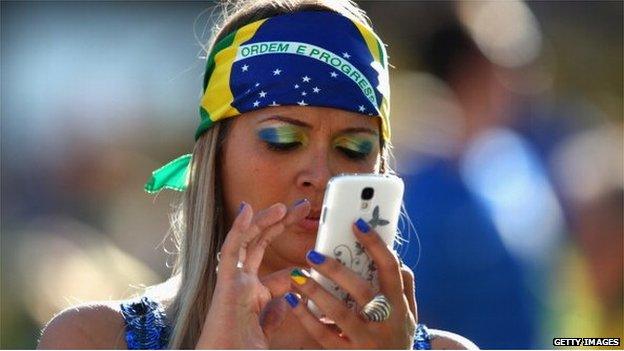
Engaged with the beautiful game?

How much money are we talking about?
The 2014 World Cup in Brazil brought in $4.8bn (£3.1bn) over four years - the event made a profit of more than $2bn for Fifa.
Fifa is a non-profit organisation - which does however maintain a large cash reserve which amounted to more than $1.5bn (£1bn) in 2014 - and has its headquarters in Switzerland, where it is tax-exempt.
The organisation's total revenue of $5.7bn (£3.7bn) from 2011 to 2014 is not large compared to that of giant corporations - for example Coca-Cola, a Fifa sponsor, had a turnover of $46bn in 2014, external. It is however larger, averaged out over the four-year cycle, than the GDP of several of Fifa's member nations, including the Seychelles and Guinea-Bissau.
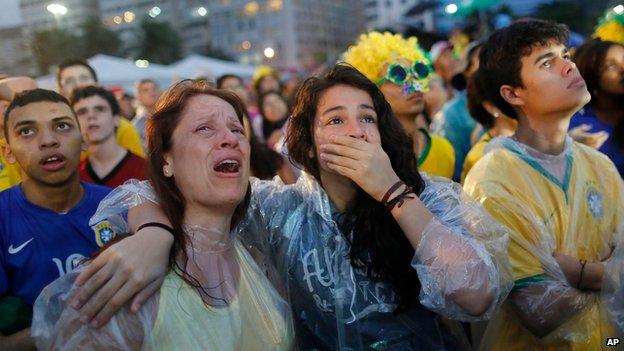
Sometimes it's best not to be a football supporter

But it's not my money.
Half of this money came from selling the World Cup TV rights to national broadcasters for substantial sums (though these amounts are not published) - and the cost of these rights has soared.
In the UK, the BBC and ITV broadcast World Cup matches and paid £220m ($338m) between them for the 2010 and 2014 World Cups, according to the Telegraph, external (the BBC press office would not say how much it pays to Fifa, citing commercial confidentiality).
Germany's Der Spiegel reports (in German), external that public sector broadcasters ARD and ZDF are paying €218m ($246m; £160m) for the rights to broadcast the 2018 World Cup matches. That's 20 times what they paid for the World Cup in France 20 years earlier.
This means that if you pay the licence fee or equivalent subscription fee, you are probably contributing to Fifa's coffers.
Marketing rights for the 2014 World Cup earned $1.6bn (£1.0bn) for Fifa over the four-year cycle. So if you were a customer of one of the organisation's sponsors (which include Coca-Cola, adidas and Visa, among others), you have also, indirectly, supported the organisation.
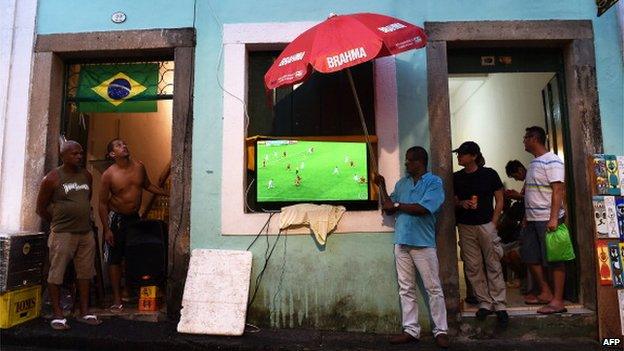
TV rights are Fifa's largest source of income

I don't care where it's held.
The World Cup is the world's most watched sporting event, and hosting it is a matter of pride and symbolism for many countries.
In 2010, South Africans enjoyed "World Cup fever" as their nation hosted - a first for Africa.
In 2006, the then United Nations Secretary General, Kofi Annan wrote that "the World Cup makes us at the UN green with envy, external" for its appeal around the world.
Russians are looking forward to hosting the World Cup in 2018, according to the BBC's Sarah Rainsford in Moscow. However US Senators John McCain and Robert Menendez urged Fifa, external to "deny the Putin regime the privilege of hosting the 2018 World Cup" in the context of the sanctions on Russia over Ukraine.
Being granted a major sporting event could be seen as an endorsement of a country's government by the world community - so even those who do not follow the matches might take an interest in the selection process.
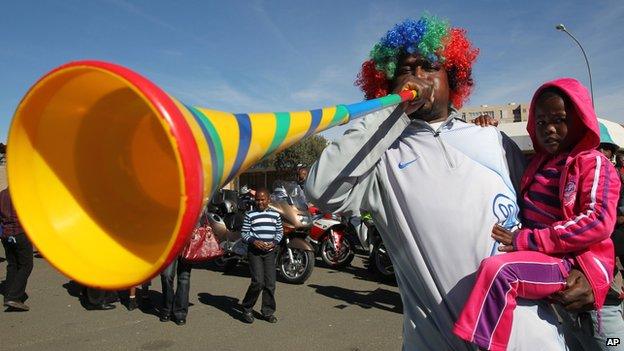
Many South Africans enjoyed the World Cup coming to their country in 2010

Why do human rights groups care?
The US investigation into alleged corruption in Fifa does not cover the process which awarded the 2022 World Cup to Qatar, although Swiss authorities have launched an inquiry into that and the 2018 competition.
However, conditions for migrant workers in Qatar have been strongly criticised by many since the decision to award the Gulf state the tournament in 2010.
Last week a graphic in a Washington Post blog, external, which compared the number of migrant worker deaths in Qatar since 2010 (from all causes) to worker deaths estimated for other international sporting events, was widely shared online.
The Qatari government issued a strongly worded rebuttal, external, denying that a single worker had been killed on a World Cup construction site.
In May 2015 Amnesty International said that a year on from the Qatari government's promise to improve conditions for migrant workers, none of the reforms had been implemented, external.
One of the campaigners, Jaimie Fuller, the CEO of Australian swimwear manufacturer Skins, described the issue of migrant workers' rights and safety in Qatar as "just the tip of the Fifa iceberg and that issue alone graphically shows their negligence and self-denial when it comes to confronting international football's major issues".
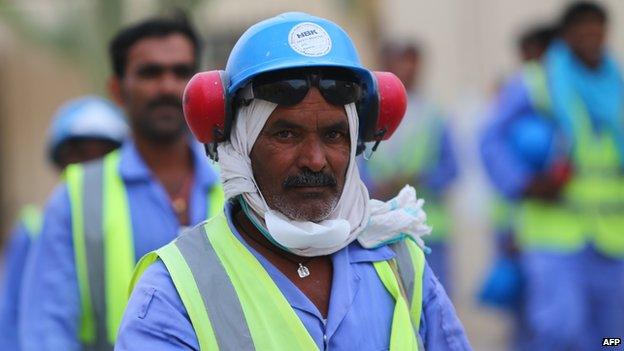
Activists say conditions for migrant workers on Qatari construction sites are harsh

But I really don't care about football.
"Fair play is a fundamental part of the game of football," states Fifa's website, external.
The anti-corruption organisation Transparency International (TI) agrees. It says, in its 2011 report into Fifa, external, that corruption damages not only the image of sport, but could also compromise its influence in "spreading the values of good sportsmanship".
Deborah Unger from TI argues that if a sports organisation is run badly, then how can there be a level playing field? And if the playing field is not level, how can we enjoy sports?
More broadly, Transparency International says that corruption "hurts everyone who depends on the integrity of people in a position of authority". And those people could be unelected football officials as well as political leaders.
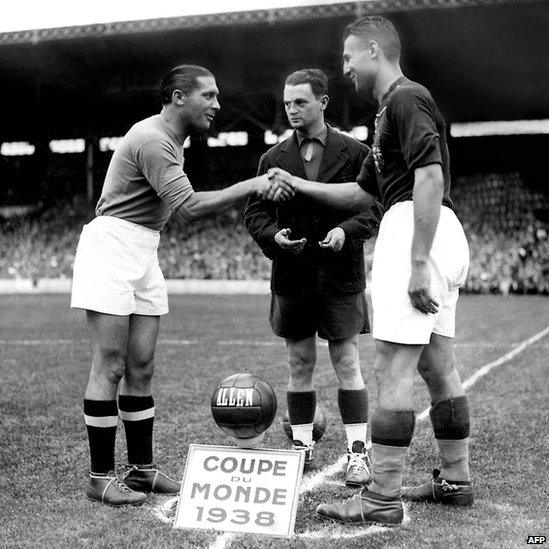
Is it all fair play at Fifa?
